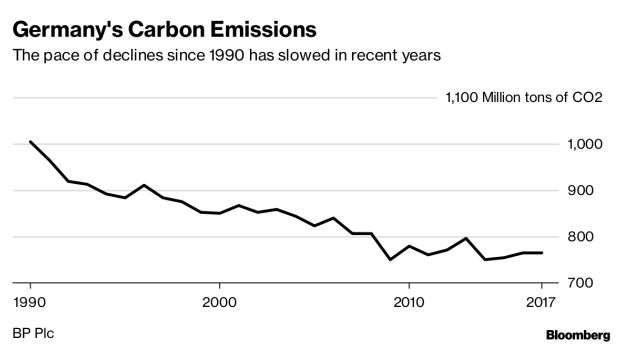Jul 12, 2019
Merkel Plans Broad Emissions Levy in Last Major Climate Push
, Bloomberg News

(Bloomberg) -- Chancellor Angela Merkel’s plan to make it more costly to pollute in Europe’s biggest economy will take another step forward on Friday when a panel of government advisers will present fresh proposals.
In what looks likely to be her last major contribution to Germany’s climate policy before stepping down in two year’s time, Merkel has made it a priority this summer to get coalition backing for putting a price on the transport and heating industries, sectors not covered by Europe’s emissions trading scheme. Together they represent more than a third Germany’s greenhouse gases.
“Extreme weather events are becoming more frequent,” Merkel said in a Saturday podcast. Concerted action with wider pollution pricing needs to be agreed by the autumn, she said.
Germany has pledged to cut emissions by 55% by 2030, compared with 1990 levels. But by this year, the country had reduced CO2 output by only 30%.
Merkel faces immense risks to get the new policy right. Political polls and “Fridays for Future” demonstrations underline voters’ impatience with tardy progress in tackling climate pledges. At the same time, any move to put new fiscal burdens on fossil transport and heating fuels may come with a political price for Merkel.
Her party of Christian Democrats faces three state elections from September in eastern German states where the populist Alternative for Deutschland party have made inroads and many thousands of people are employed at coal plants and mines. The AfD oppose Merkel’s timetable to pull out of coal achieved by consensus earlier this year. And, hiking fuel and heating costs just as the economy begins to wobble may draw a backlash from the wider electorate too.
The policy options that will be outlined by the “Five Wise Ones” panel of economists on Friday mark an official start to cabinet deliberations on pricing CO2 that will roll on through the summer.
They join a raft of rival proposals from opposition parties, Merkel’s own Social Democrat allies, industry lobbies and think tanks that either champion the introduction of a new tax on transport and heating fuels, or the extension of the emissions trading scheme to those sectors.
Social Democrat Environment Minister Svenja Schulze favors a tax that can be raised annually and is linked to end-of-year rebates for less well-off consumers. Her stance is backed by think tanks including the DIW and the opposition Greens, who want to tax emissions in transport and heating at the equivalent cost of 40 euros per ton. That’s much higher than where permits are currently trading.
Beware of voter disgruntlement, Merkel’s CDU and its Bavarian Christian Social Union affiliate both reject the option of a new CO2 tax in favor of adjusting current fiscal instruments such as the transport fuel levy that raises about 60 billion euros annually.
Georg Nuesslein, a CSU lawmaker who’s helping frame caucus policy, backs extending a version of the European market to heating, gasoline and diesel, a proposal rejected by Schulze as too bureaucratic.
Merkel’s given no clue so far where she stands but does conspicuously avoid reference to the word “tax” in recent comments.
After receiving the panel’s proposals Friday, Merkel will summon a “Climate Cabinet” made up colleagues including the ministers for finance, for economy and energy and for the environment to thrash out proposals.
The group will meet on July 18, four times in August and plan to sign off on proposals on Sept. 20, according to an inter-ministerial document seen by Bloomberg.
To contact the reporters on this story: Brian Parkin in Berlin at bparkin@bloomberg.net;William Wilkes in Frankfurt at wwilkes1@bloomberg.net
To contact the editors responsible for this story: Reed Landberg at landberg@bloomberg.net, Lars Paulsson
©2019 Bloomberg L.P.


